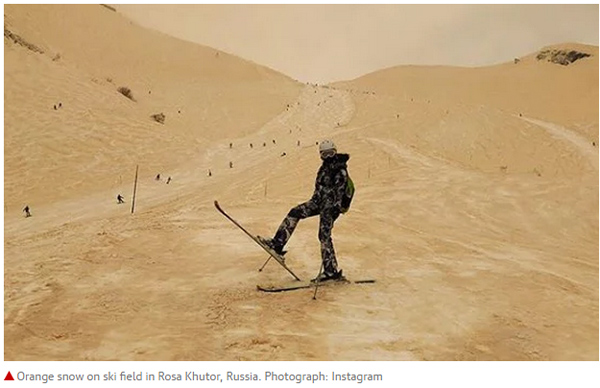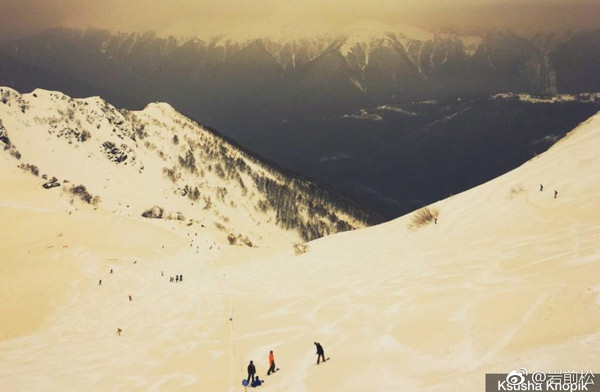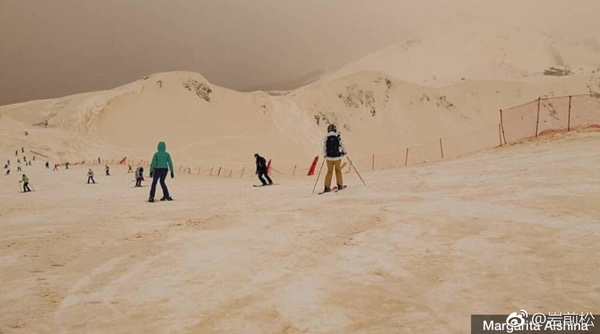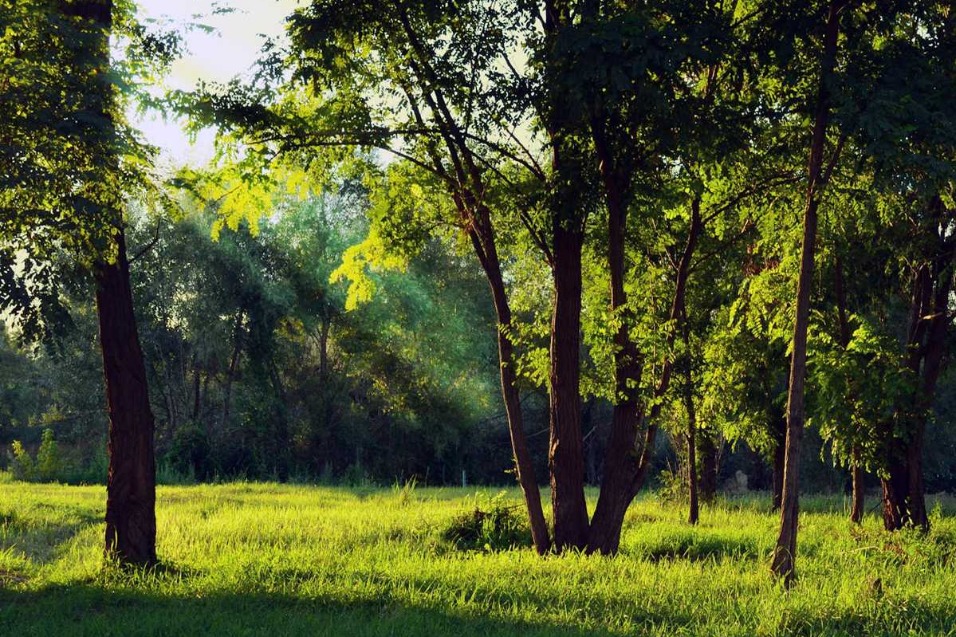欧洲飘起“橙色的雪” 原因竟然是…… People in Europe are freaking out over this fall of crazy orange snow
中国日报网 2018-03-26 13:41

雪在我们印象中一直是洁白无瑕的,但是近日东欧多个地区却惊现“橙色雪”,这场可怕的橙色暴风雪将大片雪白的山脉变成了赤褐色,火星般的场景让人怀疑是末日降临。那么这种诡异的颜色是如何形成的?来看看气象学家怎么说。
|

截图来自卫报网站 |
A recent fall of really strange orange-tinted snow is making headlines after it swept across a swathe of Eastern Europe. Images on social media from Russia show mountainous landscapes tinged auburn, where usually they are pristine white.
最近东欧多地上空飘起橙色雪,这一奇特景象抢占了新闻头条。俄罗斯社交媒体的图片显示,往常雪白的大片山脉被染成了赤褐色。
Although it resembles what we might imagine snow on Mars to look like, the explanation is actually pretty simple.
尽管它看上去像极了我们想象中的“火星雪”,但是这个现象背后的原因其实很简单。
According to the BBC, the orange colouration is caused by fine particles of sand being lifted from the Sahara into the atmosphere, travelling across the world and falling back to the ground mixed in with rain and snow.
据BBC报道,雪的橙色调源于撒哈拉沙漠飘来的细沙,这些细沙经历了“环球旅行”,最后混在雨雪中降落到地面。
It occurs once every five years or so - although this year's orange snow is particularly vibrant, due to a desert sandstorm that was so big it was seen in NASA satellite imagery travelling across the globe, CNN reports.
据CNN报道说,这种现象大约每五年会发生一次,不过今年的橙色雪颜色格外鲜亮,这是因为此前撒哈拉沙漠发生了一场超大规模的沙尘暴,连美国宇航局的卫星图像上都可以看得见这场沙尘暴在全球范围内的运动。
Social media users have posted photos of a ski resort in Sochi, Russia with its eerie orange slopes. The bizarre snow has also reportedly fallen on Bulgaria, Ukraine, Romania, and Moldova.
社交媒体用户们上传了在俄罗斯索契的一个滑雪度假地的照片,照片上可以看到异常的橙色山坡。据报道,保加利亚、乌克兰、罗马尼亚和摩尔多瓦也下了这种奇特的雪。



图片来自岩前松微博
"There has been a lot of lifted sand or dust originating from North Africa and the Sahara, from sand storms which have formed in the desert," meteorologist Steven Keates from the UK Met Office told The Independent.
英国气象局的气象学家史蒂芬·基特斯告诉《独立报》说:“橙色雪中有很多源于北非和撒哈拉的浮沙或浮尘,这些浮沙和浮尘源于沙漠中形成的沙尘暴。”
"As the sand gets lifted to the upper levels of the atmosphere, it gets distributed elsewhere. Looking at satellite imagery from NASA, it shows a lot of sand and dust in the atmosphere drifting across the Mediterranean. When it rains or snows, it drags down whatever is up there, if there is sand in the atmosphere."
“沙子被吹到高空中后,又散布到其他地方。美国宇航局的卫星图像显示,大气中的很多沙尘都飘过了地中海上空。在下雨或下雪时,如果空中有沙尘,就会一起落到地面。”
It seems only fair that the Sahara comes to the snow after the snow came to the Sahara in December 2016- the first time since 1979. And it's done so again in 2017 and this January, too.
既然撒哈拉沙漠都下雪了(2016年12月撒哈拉就下过雪,那是自1979年以来该地区首次降雪),撒哈拉的沙子也应该变成雪才算公平。2017年撒哈拉沙漠又一次下了雪,今年1月也下了。
It is not the first time eastern Europeans have experienced an eerie snow-tint.
这不是东欧人第一次见到这种怪异的雪色了。
A similar phenomenon happened in 2007 when mysterious “oily” orange snow fell across three regions of southern Siberia.
2007年就曾发生过类似的现象,当时神秘的“油腻”橙色雪降落到西伯利亚南部的三个地区。
It's also much more benign than orange snow that fell on Siberia in 2007. Then, locals reported that the snow was foul-smelling and oily to the touch, possibly the result of chemical pollution.
这次下的橙色雪比2007年西伯利亚下的橙色雪要仁慈多了。当时,当地人报告称,橙色雪腥臭难闻,而且摸起来还油腻腻的,可能是化学污染的结果。
This time, the orange snow is just a nice reminder of how connected we truly are by our planet's weather and climatic systems.
这一次的橙色雪只是温和地提醒我们,地球的天气和气候系统是如何真正把我们联系在一起。
英文来源:Science Alert、卫报
翻译&编辑:丹妮

















 英语点津微信
英语点津微信 双语小程序
双语小程序